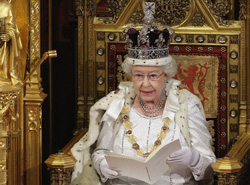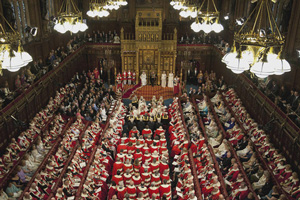Queen’s Speech focuses on immigration reform
Daily News Article — Posted on May 13, 2013
 (by Laura Smith-Spark, CNN) London — The UK government has put immigration reform and the economy at the heart of its plans for the new parliamentary session, which opened Wednesday (May 8th) with the Queen’s Speech.
(by Laura Smith-Spark, CNN) London — The UK government has put immigration reform and the economy at the heart of its plans for the new parliamentary session, which opened Wednesday (May 8th) with the Queen’s Speech.
The address by Queen Elizabeth II for the ceremonial state opening of Parliament [every May] is written by the government, although read out by the monarch.
At the center of the government’s legislative agenda is a new bill with “tough new measures to continue immigration reform and prevent illegal immigrants accessing services they’re not entitled to,” the Home Office said. [NOTE: The Home Office is a ministerial department of the Government of the United Kingdom, responsible for immigration, security, and law and order. As such it is responsible for the police, UK Border Agency, and the Security Service (MI5). It is also in charge of government policy on security-related issues such as drugs, counter-terrorism, and ID cards.]
“The bill will ensure that this country attracts people who will contribute and deters those who will not,” the queen said.
The legislation will also “contain measures to make it harder for people to prevent their removal with spurious [fake] appeals, reduce the complexity of immigration law and make clear that foreign national offenders should be deported, except in extraordinary circumstances,” the Home Office said.
A move to the right on immigration may be a response to the political threat posed by the UK Independence Party, known as UKIP, which has made gains in local elections at the expense of the Conservatives.* UKIP has promised steps to limit the number of migrants entering Britain. [*NOTE: Britain’s Conservative Party is similar to U.S. Republican Party; Britain’s Labour Party holds ideologically socialist views, is most similar to U.S. Democrat Party]
Measures to make deportation easier may also reflect the Home Office’s long-running, and so far unsuccessful, efforts to deport radical Islamist cleric Abu Qatada. A series of legal appeals have kept the Jordanian national in the country. [A resident in the UK since September 1993, Qatada was once described as Osama bin Laden’s right-hand man in Europe. The British government has been trying to deport Qatada to Jordan, where he was convicted of terror charges in his absence in 1999, for nearly eight years. Last month British Home Secretary Theresa May (similar to U.S. Sect. of Homeland Security) was denied permission by the UK’s Court of Appeal to take the fight to deport Qatada to the Supreme Court.]
Lawmaker Yvette Cooper, of the opposition Labour Party, criticized the measures outlined in the Queen’s Speech, saying they fail to tackle key issues around the exploitation of foreign workers and illegal immigration.
“Immigration is important for Britain and needs to be controlled and managed so it is fair for all,” she said.
The government will also work to boost Britain’s economic competitiveness so it can continue to succeed in the world, the Queen’s Speech said.
“To this end, it will support the growth of the private sector and the creation of more jobs and opportunities,” the queen said.
In addition, the government intends to pass new measures to tackle anti-social behavior, cut crime and reform the police.
The legislative agenda also includes more measures to reform the state benefits system, “helping people move from welfare to work,” the speech said.
The government’s sweeping welfare reforms, affecting state help for the disabled and unemployed, have already been controversial in Britain, which is struggling with a large budget deficit.
The Conservatives govern in coalition with the Liberal Democrat Party [social liberal/libertarian]. …..
CNN’s Antonia Mortensen contributed to this report. Reprinted here for educational purposes only. May not be reproduced on other websites without permission from CNN.
Questions
NOTE TO STUDENTS: Read the "Background" and watch the videos under "Resources" before answering the questions.
1. a) When does the Queen's Speech take place?
b) Who writes the Queen's Speech?
2. What is the purpose of the Queen's Speech?
3. What will new legislation introduced in the Queen's Speech propose regarding illegal immigration?
4. What are believed to be two reasons the Conservative Party (currently the majority party; Prime Minister David Cameron is a Conservative) has presented the legislation that it did on immigration?
5. What does Labor Party lawmaker Yvette Cooper think is a more important immigration issue than what the Conservative Party is addressing?
6. List some of the other main issues parliament will address in the upcoming session, as describe by the Queen in her speech.
Background
THE QUEEN'S SPEECH EXPLAINED:
The State Opening of Britain's Parliament marks the formal start of the parliamentary year and the Queen's Speech sets out the government’s agenda for the coming session, outlining proposed policies and legislation. It is the only regular occasion when the three constituent parts of Parliament - the Sovereign, the House of Lords and the House of Commons - meet.
When is State Opening?
State Opening happens on the first day of a new parliamentary session or shortly after a general election.
The Fixed Term Parliament Act, which sets out new rules on the timing of general elections, received royal assent (became law) on September 15, 2011. This means that the next general election will be on May 7, 2015. There will be a state opening soon after this date.
What happens during State Opening?
State Opening is the main ceremonial event of the parliamentary calendar, attracting large crowds and a significant television and online audience. It begins with the Queen's procession from Buckingham Palace to Westminster, escorted by the Household Cavalry.
The Queen arrives at Sovereign's Entrance and proceeds to the Robing Room. Wearing the Imperial State Crown and the Robe of State, she leads the Royal Procession through the Royal Gallery, packed with 600 guests, to the chamber of the House of Lords.
The House of Lords official known as 'Black Rod' is sent to summon the [members of the House of] Commons. The doors to the Commons chamber are shut in his face: a practice dating back to the Civil War, symbolizing the Commons' independence from the monarchy. Black Rod strikes the door three times before it is opened. Members of the House of Commons then follow Black Rod and the Commons Speaker to the Lords chamber, standing at the opposite end to the Throne, known as the Bar of the House, to listen to the speech.
The Queen's Speech
The Queen's Speech is delivered by the Queen from the Throne in the House of Lords. Although the Queen reads the Speech, it is written by the government. It contains an outline of its policies and proposed legislation for the new parliamentary session.
After the Queen's Speech
When the Queen leaves, a new parliamentary session starts and Parliament gets back to work. Members of both Houses debate the content of the speech and agree an ‘Address in Reply to Her Majesty’s Gracious Speech’. Each House continues the debate over the planned legislative programme for several days, looking at different subject areas. The Queen's Speech is voted on by the Commons, but no vote is taken in the Lords.
History of State Opening
Traditions surrounding State Opening and the delivery of a speech by the monarch can be traced back as far as the 16th century. The current ceremony dates from the opening of the rebuilt Palace of Westminster in 1852 after the fire of 1834. (from the British Parliament's official website: parliament.uk/about/how/occasions/stateopening)

